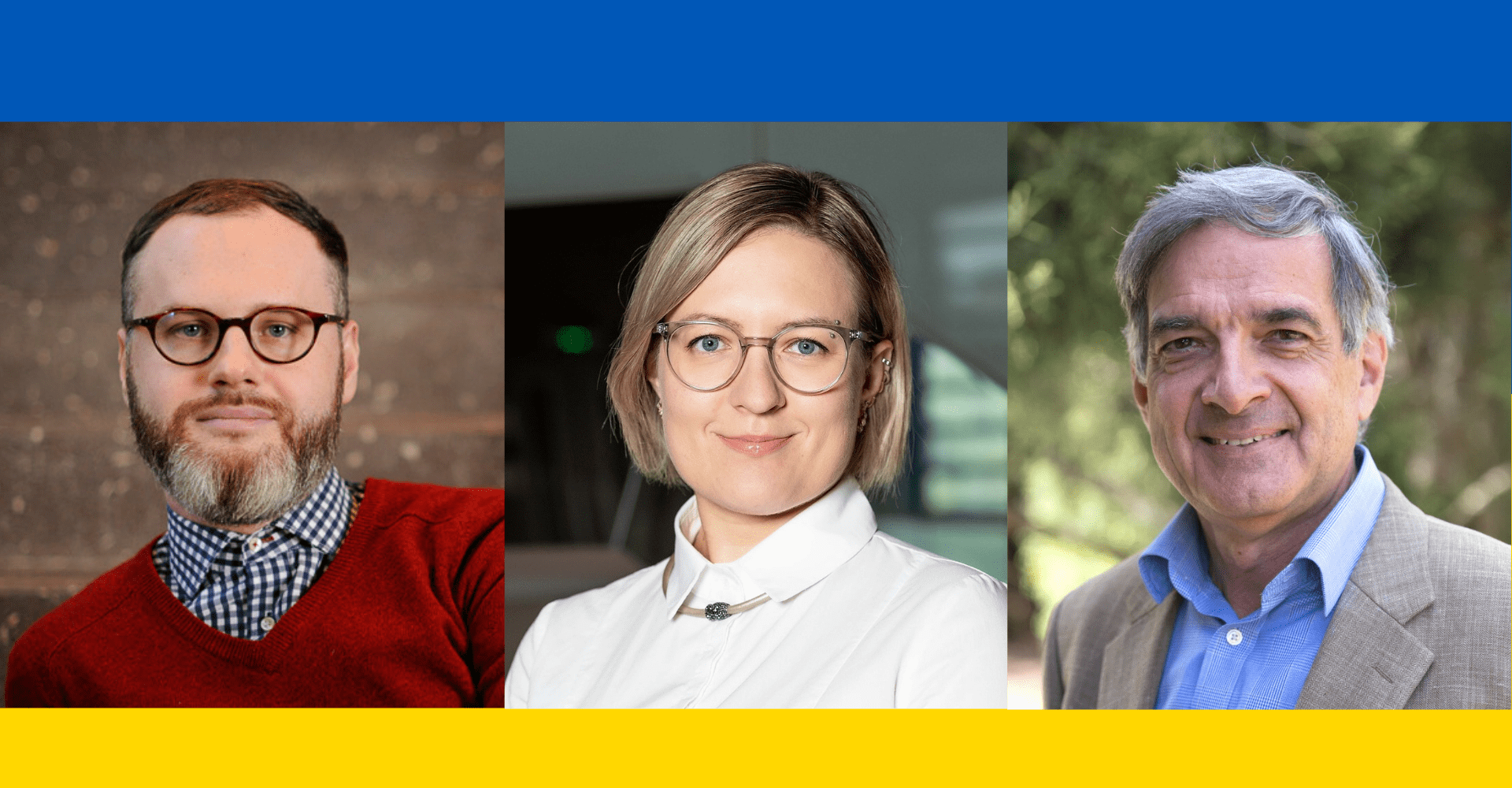
Resistance: Russia’s War on Ukraine, Part I
In the first instalment of our special series of online events, ‘Russia’s War on Ukraine’, Dr Olga Boichak, Dr Roman Horbyk and Professor Marko Pavlyshyn reflect on different aspects of the theme of ‘Resistance’.
Abstracts
Olga Boichak, ‘Objects of Violence or Sites of Resistance? Understanding Grassroots Mobilisation in Wartime Ukraine’
Ukraine is once again at the epicentre of the news due to a full-scale military aggression from Russia. Yet, the mass-mediated narratives and official statements do little to shed light on grassroots activism happening against the backdrop of war. This presentation brings to the fore these networks of resistance to Russian occupation, mapping the geopolitical and geocultural shifts brought about by civil society activists and volunteers. My specific interest is in the categories of meaning that define the contemporary Ukrainian state and the role citizens play in narrating social change and engaging in a collaborative construction of futures in a moment of crisis.
Roman Horbyk, ‘The Territory Resists the Map: Geolocating Reality and Hyperreality in the Russo-Ukrainian War’
“The map precedes the territory” is a famous adage used by Jean Baudrillard to define the concept of simulacrum, a sign that has no relation to reality whatsoever. Russian state propaganda, particularly television, has long been exemplary in its use of simulation to produce hyperreality, to the extent that the very state policy of Russia came to be based on simulacra. The discursive preparation for the 24 February invasion became a case in point: suffice to manufacture the representation, the map – it seemed – and the territory would soon enough be replaced with it, especially if subjected to a complex of “military-technical measures”. However, the enaction of this discourse in reality also created a unique situation where the hyperreal was confronted with the real, and the (fake) map was forced to confront the territory it was imposed on. So, what happens when the territory begins to fight back? What happens when the real resists the hyperreal? I will try to map out these paradoxes which have arguably been at the heart of Western misreading of the Russo-Ukrainian War since 2014, juxtaposing them with lessons from the role that communication infrastructure and weaponised mobile communication have played in the war so far. After all, the Russian maps turned out to be inadequate in more than one way.
Marko Pavlyshyn, ‘Motivating Ideas, Images and Narratives of Resistance to Invasion’
What ideals do the political leaders of Ukraine appeal to when they call on Ukrainian citizens to defend their country? What picture emerges from public forums, including social media, of values that ordinary people in Ukraine consider worthy of protecting? I suggest that key among them, and articulated (though in different terms) by spokespeople of the Ukrainian government and by members of the public, are the notion of Ukraine as a territory that must remain integral and inviolate; and the idea of Ukraine as a sovereign state in which, through democratic processes, the Ukrainian people can determine their destiny. While such a civic conception of Ukraine, able to be shared by persons of differing cultural orientations and ethnicities, has taken centre stage, more traditional identity markers such as language loyalty or adherence to particular models of the historical past have receded in importance.
Speaker Bios
Olga Boichak is a Lecturer in Digital Cultures at the University of Sydney. She is a sociologist with expertise in computational social science, and her research interests span networks, narratives, and cultures of activism in the digital age. She is an editor of the Digital War journal and has a track record of publications on contemporary Ukraine with a focus on volunteering, transnational mobilisation, and diasporic humanitarianism surrounding the Russian-Ukrainian war. Her work has appeared, among others, in Big Data & Society, International Journal of Communication, Media, War & Conflict, and Global Networks, and she is a frequent commentator on Russia–Ukraine relations in the media.
Roman Horbyk is a postdoctoral researcher at Södertörn University (Stockholm). His published studies are largely interdisciplinary and focus on different aspects of media, history and language; Roman’s research interests include postcolonial theory, sociolinguistics, media power, fake news, history of representations and ideas. Roman has also extensively worked as a print and TV journalist with an over decade-long career. Apart from that, he is active as a playwright and a screenwriter whose most notable credits include Pryputni (2017) based on Roman’s play The Centre. His current research project deals with how mobile phones and other portable communication devices are used by soldiers and civilians on the frontlines in Ukraine.
Marko Pavlyshyn is an emeritus professor of Ukrainian Studies at Monash University. He is the author of Ol’ha Kobylians’ka: Prochytannia (2008), Kanon ta ikonostas (1997), editor and co-editor of scholarly collections including, with Giovanna Brogi and Serhii Plokhy, Ukraine and Europe: Cultural Encounters and Negotiations (2017), and author of articles and chapters on modern and contemporary Ukrainian literature, many from the perspective of postcolonial studies. He is a fellow of the Australian Academy of the Humanities and an international member of the National Academy of Sciences of Ukraine.
This special series of events is co-hosted by:
- Melbourne Eurasianist Seminar Series at the University of Melbourne;
- Ukrainian Studies Foundation in Australia;
- Ukrainian Studies Association of Australia and New Zealand
A recording of Part II: History (Assoc. Prof. Olga Bertelsen, Assoc. Prof. Oxana Shevel, and Prof. Serhy Yekelchyk) can be accessed here.
A recording of Part III: Propaganda (Prof. Natalia Chaban, Dr Julie Fedor, Dr Robert Horvath, Dr Volodymyr Kulyk) will be published shortly.